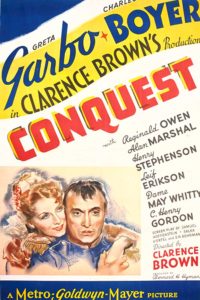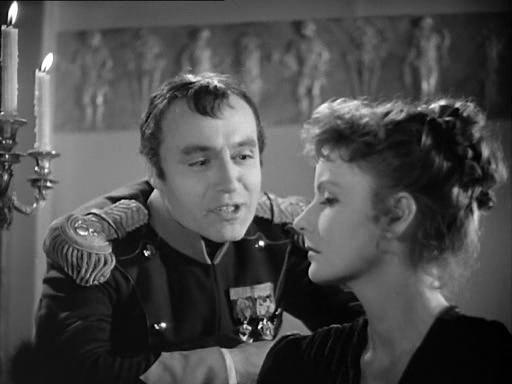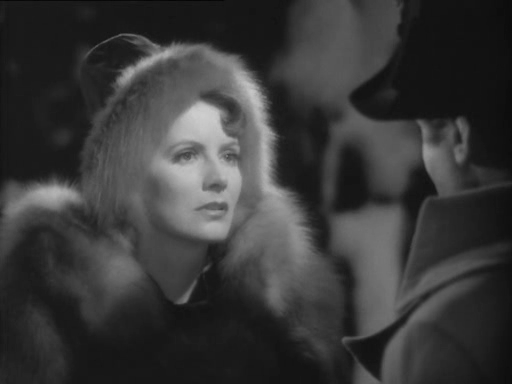“Perhaps you have been made beautiful, that Poland might be made free.”
|

Synopsis:
Despite the disapproval of her much-older husband (Henry Stephenson), a young Polish countess (Greta Garbo) heeds a romantic call from Napoleon Bonaparte (Charles Boyer) on behalf of her nation.
|
|
Genres, Themes, Actors, and Directors:
- Clarence Brown Films
- Charles Boyer Films
- Greta Garbo Films
- Historical Drama
- Infidelity
- Romance
- Royalty and Nobility
Review:
Greta Garbo’s final dramatic role was this biographical portrayal of Countess Marie Walewska, notorious for being Napoleon Bonaparte’s long-time lover out of patriotism (and eventually bearing one of his children). Boyer is satisfyingly convincing as Napoleon, embodying the emperor’s bearing with aplomb: this is a man unabashedly assured of his own importance on the world stage as well as his appeal to women. (Given that Boyer was 5’9 in real life and Garbo was 5’7.5, clever blocking and camerawork was also clearly done to make the physical impersonation even more convincing.) The storyline itself is fairly standard melodrama, if perhaps a bit more interesting than usual given it’s based on a true story — and Cedric Gibbons’ Oscar-nominated art direction is noteworthy (as are Adrian’s gowns). However, this film — which purportedly “lost more money for MGM than any other of its films during the period from 1920 to 1949” — is only must-see for diehard Garbo or Boyer fans.
Redeeming Qualities and Moments:
- Charles Boyer as Napoleon Bonaparte

- Greta Garbo as Countess Marie

- Fine period sets and costumes

Must See?
No, though it’s worth a one-time look.
Links:
|
One thought on “Conquest (1937)”
First viewing. Not must-see.
I’m no expert on the life of Bonaparte (and Wikipedia is no help here in terms of what is and is not true in this film’s view) – but, as is, the film is reasonably compelling. One must assume most of it is manufactured but there is at least the sense of an attempt at logic regarding the central relationships.
I found myself caught up in the dynamic between Garbo and Boyer (even when some of it strained credulity). The two stars have an interesting chemistry together. I particularly enjoyed the moments of emotional power on display via Maria Ouspenskaya (as Garbo’s mentally challenged sister-in-law) and Dame May Whitty (as Bonaparte’s mother).
Ultimately, the film stands as Hollywood’s version of history but, for what it is, it’s better than what one might expect.